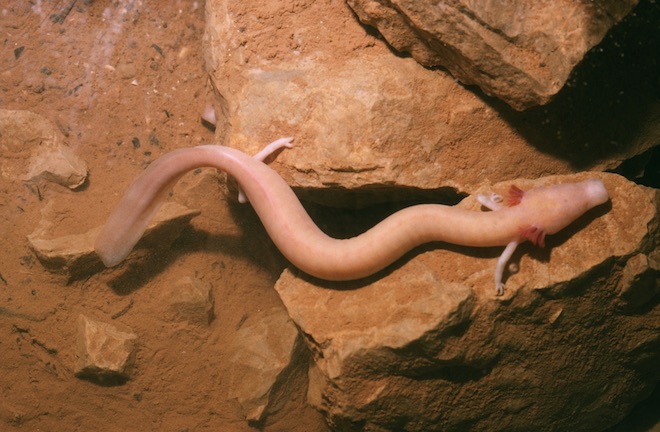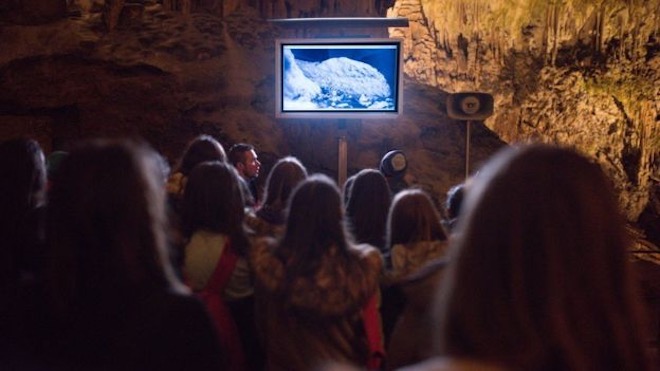In Slovenia, in the cave, which is visited by millions of tourists every year, is an unusual and rare amphibian guarding large clutch of eggs.

© globallookpress.com
European Proteus ?? tailed amphibian that lives in underground lakes and streams in the Balkans. They are expected to live more than 100 years, but only one ?? multiplying 2 times in 10 years. Female in the aquarium in the cave Postojna postponed 50 ?? 60 eggs ?? and three of them are already showing signs of growth. No one yet knows how many young hatch and exactly how long it will take

© Postojnska jama
According to the biologist, working in a cave, Caco Veldt Township, female lay eggs beginning January 30 ?? 1 ?? 2 each day. Veldt Township and his colleagues made eggs pictures in a dark cave, using a long exposure to capture the tiny embryos and their development. In order to hatch, it takes about 120 days, but this is only a rough estimate made on the basis of Proteus colonies data created in the 1950s in an underground laboratory in the French Pyrenees. There, these amphibians were living in a little more warm water ?? 11 degrees, but the temperature of the water in the cave in Slovenia ?? 9 degrees, so the cycle may be extended.

© Postojnska jama
This event is unique ?? It provides an opportunity to observe the mysterious European Proteus (also called OLM, or “human fish”) during the breeding season in the same cave where they had lived for millions of years. According to a member of the Zoological Society of London, Dr. Dusan Jelic, this is a very significant moment ?? currently there is not much data on the reproduction of these animals. Jelic studies olmov wild, diving in underwater cave systems in Croatia.
If the young hatch and will develop properly ?? This, according to Jelic, is something incredible, because in the wild has not been able to find the eggs. Rather, they are hidden in the ground in caves slozhnodostupnyh. In Postojna ?? a whole system of caves where live wild population olmov, it is noteworthy that the brickwork has been delayed in an aquarium in one of the most passable places in the cave. This is an extraordinary event and the staff worried about the eggs as they are very sensitive.
In 2003, it laid eggs OLMA another female, but they are not hatched and were eaten by other olmami in the aquarium. all precautions have been taken at this time ?? left in the tank is only a female, it was closed to protect the eggs from the light, the water is supplied supplemental oxygen, according to “Bi-bi-si».
Using an infrared camera on the big screen, visitors and employees can see what happens in the cave.

© Postojnska jama
In general, there is no movement, but the female occasionally checks the eggs, lays one or more brushes off amphipods ?? hungry small crustaceans, which she can not see, but is detected by electrically sensitive organs on the face. The animal also has a powerful sense of smell, which helps monitor the eggs. Veldt Township noted that eggs have a smell, so the female can recognize which of them are alive and which are dead. Due to the scarcity of food in the cave system it feeds on unfertilized eggs. OLM is very popular in Slovenia, before the introduction of the euro, they even appeared on coins.
Hundreds of ice back when the floods washed out of the cave olmov lakes and rivers, the locals thought it was ?? Young dragon. In the last few weeks, “mother-dragon” has become a local celebrity, and biologists working in the cave, celebrate responsibility and the importance of this point.
No comments:
Post a Comment